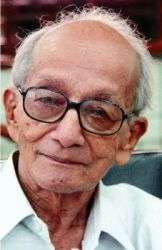Subodh Roy
| Subodh Roy | |
|---|---|
 | |
| Personal details | |
| Born |
1916 Chittagong District, Bengal Province, British India |
| Died |
2006 Calcutta, India |
| Nationality | Bengali, Indian |
| Political party | Communist Party of India (Marxist) |
| Profession | Indian independence movement activist, Revolutionist |
Subodh Roy (Bengali: সুবোধ রায়; 1916–2006)[1] (also known as Jhunku Roy) was a Bengali Indian independence activist, revolutionary and politician.
Biography
Subodh Roy was born in 1916 in a rich family at Chittagong in erstwhile-undivided Bengal. He was the youngest participant in the Chittagong armoury raid in 1930-31 under the direction of the famous revolutionary leader Surya Sen (Masterda). He had been in the first batch to be sentenced at the age of 14, he participated in the Chittagong armoury raid, along with Surya Sen and other revolutionaries on 18 April 1930.[1] After the trial, Subodh Roy was deported to the Cellular Jail in Port Blair in 1934.[1]
Subodh Roy would later relate notable stories, and only under hard persuasion, since he was sternly unwilling to come out with personal anecdotes, how he had purloined and made off with a .303 gun and a cache of bullets from his father’s locker after suitably procuring duplicate keys. The gun was used repeatedly till the revolutionaries ran out of bullets on the hills and rolling lands around Chittagong town. A young legend in the making, young ‘Jhunku,’ all of 13 years, fought shoulder-to-shoulder with Masterda’s group of armed revolutionaries in the tracts of Chittagong and it was he who succeeded in warding off the pursuing army platoons by fierce rear-guard action, allowing his comrades to live and fight the British another day. Later apprehended and brutally tortured by the British police "they would kick my small body across the interrogation room, and repeatedly, to extract confession, and I would repeatedly disappoint them" was how Subodh Roy would later put it laconically, Subodh Roy was initially sentenced to be hanged but was later sent to Andaman as the youngest detenue. Among the hard and brutal life that the island prison offered, the revolutionaries would bunch together and start to form a communist group, reading smudged, handwritten and smuggled copies of Vladimir Lenin’s State and Revolution and the Communist Manifesto, and then dialectically arguing and counter-arguing the basic tenets of Marxism-Leninism. "I grew up to become a communist in the islands, and as a communist, life has been a welcome learning process for me ever since," said Subodh Roy who was the last to leave the Cellular Jail. After the release from jail in 1940, he joined communist politics and became a member of the Communist Party of India. After the independence, he shifted to Calcutta and joined as a wholetimer at the Provincial Centre of the Party. After the split in Communist Party of India in 1964, Subodh Roy sided with the Communist Party of India (Marxist) (CPI(M)). And he was a longstanding member of the West Bengal state committee of the CPI(M).[2]
Subodh Roy made a major scholarly contribution to the history of the communist movement. After research in the National Archives, he edited a book "Communism in India: Unpublished Documents".[2]
Popular culture
Delzad Hilwade played the role of young Subodh Roy(Jhunku) in Bedabrata Pain's film Chittagong.[3]
References
- 1 2 3 "Model revolutionary". Hinduonnet.com. 1930-04-18. Retrieved 2010-11-01.
- 1 2 "Comrade Subodh Roy Passes Away". Pd.cpim.org. 2006-09-03. Retrieved 2010-11-01.
- ↑ http://www.indianexpress.com/news/bedabrata-pain-sacrificed-a-lot-for-chittagong-anurag-kashyap/1013670
|